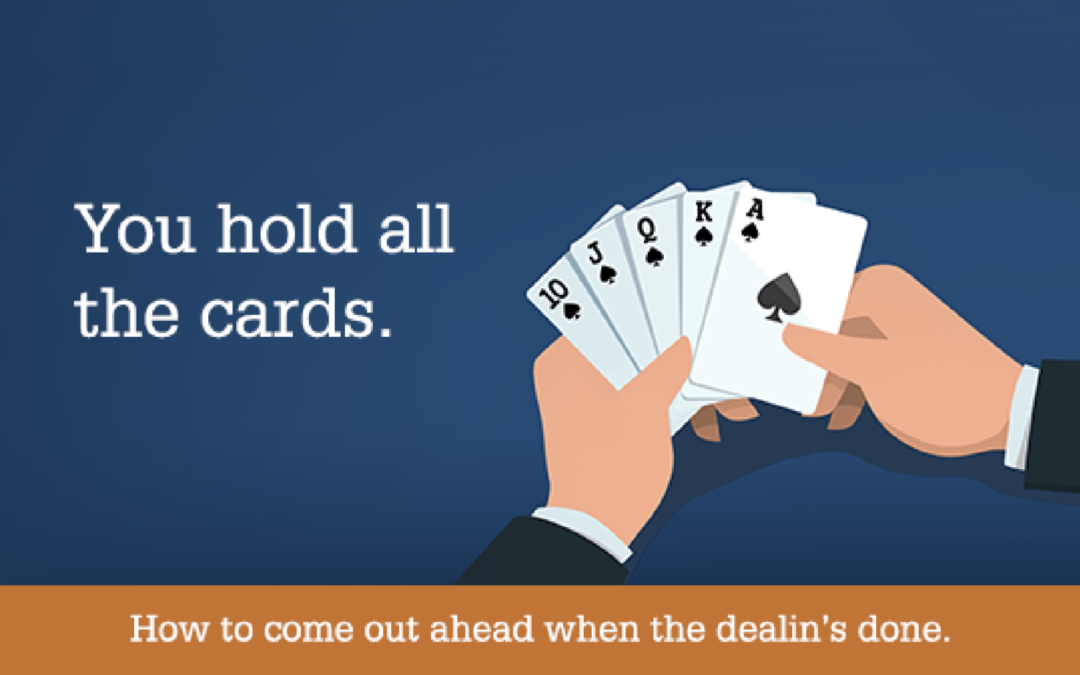When Kenny Rogers’ death occurred nine days after the COVID-19 global pandemic was declared, it was said that the 81-year-old singer truly knew when to fold ‘em. The iconic singer left a lasting impression on the entertainment world and beyond with his version of a song called “The Gambler.” The hit 1978 song struck such a chord with listeners that a 5-film television movie series starring Kenny Rogers was based on the song.
“The Gambler” isn’t actually about gambling but about life and knowing how to best play the hand you’re dealt. The chorus is especially instructive, running through a list of how-to-deal-with-life scenarios. These scenarios certainly apply to business negotiation as well and continue to resonate and influence many around the world. Today we will be reviewing the symbolism of these sayings in relations to selling your business specifically.
Know when to hold ’em
Being able to recognize when you have something good can be just as important as recognizing when you could be doing better. Understanding your advantages and knowing your worth is the first step to a fair negotiation. If your business is in a good place, you may be better off expanding your business as it currently is or transferring it to the next generation of capable hands instead of just letting it go to the highest available bidder.
Stay calm and level-headed even if those around you are pushing for a quick sale by screaming that the grass is greener elsewhere (or even completely brown everywhere). Take the time to look over your hand and its current value and bring in expert advice if need be. Do you have a strong strategic plan in place that will keep your business thriving with or without you? A plan is a powerful tool that is worth quite a bit. Poker hands and businesses are only valuable when that value is recognized, understood, and acted-upon in the right way. Don’t underestimate yourself or your business.
Know when to fold ’em
The flipside of underestimating your value is overestimating it. We can become emotionally attached to the hand we are dealt and, in turn, struggle to properly assess it. When we become overly attached to something, it can be extremely hard to let it go. However, if you don’t have a strategic plan in place or haven’t found a suitable successor, you may, indeed, need to fold. In business negotiations, folding will likely entail selling to the highest bidder while knowing that you’re not actually receiving the maximum value of the business. There can be many reasons for this – timing, market, personal circumstances. This can be a tough reality to accept, but sometimes it just makes sense to turn in your hand as is.
Know when to walk away
Having a good strategic plan together and putting thought into who your successor will be gives you the freedom to get up from the table and walk away at any time. If you have not yet done these things, it is important to do so as soon and as well as possible. Preparation is power when it comes to negotiations. In fact, if you truly have all your ducks in a row, you may not have to negotiate at all.
Know when to run
When you have everything just right, you will likely be able to sell high, take the money, and run. This takes time and patience, but the return will be well worth the effort. Having everything just right means:
- Recognizing and understanding your value
- Being able to let go
- Knowing when it’s time to get up and walk away
- Having a succession strategy in place and ready, including a solid strategic plan
- Being prepared to not only sell but to sell high and run
Never count your money when you’re sittin’ at the table
Negotiations aren’t done until the deal is final. Getting overly excited about what may be and counting your money too soon can lead to major disappointment or even disaster if things don’t ultimately work out the way you assumed they would. In short, don’t cash out before you’re done playing. There may be more game to go. As the song says as it ends, “There’ll be time enough for countin’ when the dealin’s done.”
Contact the JCG team today to learn how Johnson Consulting Group can help you plan your future.
